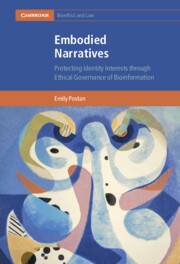Book contents
- Embodied Narratives
- Cambridge Bioethics and Law
- Embodied Narratives
- Copyright page
- Contents
- Foreword
- Acknowledgements
- Table of Cases
- 1 Attending to Identity
- 2 Mapping the Landscape
- 3 Narrative Self-Constitution
- 4 Bioinformation in Embodied Identity Narratives
- 5 Encounters with Bioinformation: Three Examples
- 6 Locating Identity Interests
- 7 Responsibilities for Disclosure
- 8 Protecting Identity in Practice
- Bibliography
- Index
- Series page
- Embodied Narratives
- Cambridge Bioethics and Law
- Embodied Narratives
- Copyright page
- Contents
- Foreword
- Acknowledgements
- Table of Cases
- 1 Attending to Identity
- 2 Mapping the Landscape
- 3 Narrative Self-Constitution
- 4 Bioinformation in Embodied Identity Narratives
- 5 Encounters with Bioinformation: Three Examples
- 6 Locating Identity Interests
- 7 Responsibilities for Disclosure
- 8 Protecting Identity in Practice
- Bibliography
- Index
- Series page
Summary
- Type
- Chapter
- Information
- Embodied NarrativesProtecting Identity Interests through Ethical Governance of Bioinformation, pp. 287 - 296Publisher: Cambridge University PressPrint publication year: 2022
- Creative Commons
- This content is Open Access and distributed under the terms of the Creative Commons Attribution licence CC-BY-NC-ND 4.0 https://creativecommons.org/cclicenses/



